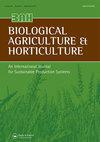Soil carbon and nutrient variations in an arable-ley rotation with organic pig production
IF 1.6
4区 农林科学
Q3 AGRONOMY
引用次数: 0
Abstract
ABSTRACT Soil carbon, nitrogen and phosphorus concentrations were determined and the soil structure evaluated for four annual courses in a rotation (Year 1, fattening, non-nose-ringed pigs at a stocking density of one pig produced per 150–200 m2 depending on seasonal conditions; Years 2 and 3, spring wheat; Year 4, reseeded grass-clover) for organically accredited pig production on a shallow calcareous soil in southwest England. Soil nitrogen and phosphorus concentrations and organic decomposition rates were highest when pigs were present, consistent with recent inputs of feed and nutrient redistributed in dung and urine. Soil nitrogen and phosphorus concentrations and organic decomposition rates declined over the subsequent courses. The overall production system was sustained by inputs of pig feed one year in four, with nutrients being carried over to subsequent years. The pigs caused significant physical damage leading to soil disaggregation, but the soil structure recovered over the following 2 years. The high concentrations of inorganic nitrogen, particularly nitrate at high concentration ‘hot-spots’ around feeders and housings, and the poor soil structure caused by the pigs represented a significant risk of loss of nutrients and soil. At this site, vertical movement of disaggregated soil and nutrients through cracks and fissures in the underlying limestone may have been an additional route of loss alongside denitrification, volatilisation, erosion and run-off.有机养猪轮作条件下土壤碳和养分的变化
测定了土壤碳、氮和磷浓度,并对土壤结构进行了评估,土壤结构为4个轮作周期(第1年,育肥猪,无鼻环猪,根据季节条件,放养密度为每150-200 m2生产1头猪;第二年和第三年,春小麦;4年,重新播种草-三叶草)在英格兰西南部的浅钙质土壤上进行有机认证的猪生产。当猪存在时,土壤氮和磷浓度和有机分解率最高,这与近期饲料投入和粪便和尿液中重新分配的营养物质一致。土壤氮、磷浓度和有机分解速率在随后的过程中下降。整个生产系统是靠每四年投入一年的猪饲料维持的,营养物质被转移到随后的年份。猪对土壤造成了严重的物理破坏,导致土壤解体,但土壤结构在接下来的2年中恢复了。高浓度的无机氮,特别是在喂食器和猪舍周围高浓度“热点”处的硝酸盐,以及猪造成的土壤结构不良,都代表着养分和土壤流失的重大风险。在这个地点,分解的土壤和营养物质通过下面石灰岩的裂缝和裂缝的垂直运动可能是除反硝化、挥发、侵蚀和径流外的另一条损失途径。
本文章由计算机程序翻译,如有差异,请以英文原文为准。
求助全文
约1分钟内获得全文
求助全文
来源期刊
CiteScore
3.30
自引率
6.70%
发文量
18
审稿时长
>36 weeks
期刊介绍:
Biological Agriculture & Horticulture aims to act as the central focus for a wide range of studies into alternative systems of husbandry, and particularly the biological or organic approach to food production. The Journal publishes work of a sound scientific or economic nature related to any aspect of biological husbandry in agriculture, horticulture and forestry in both temperate and tropical conditions, including energy and water utilization, and environmental impact.

 求助内容:
求助内容: 应助结果提醒方式:
应助结果提醒方式:


